 This Sunday, the whole Filipino Church is grateful for the canonization of the second Filipino saint: Pedro Calungsod. But, mindful of the liturgical readings this Sunday, his canonization on this day offers us even a close-to-the-heart realization of the message of Word of God to us. Blessed Pedro Calungsod was not known to us until some time when the Jesuit Padre Diego Luis de San Vitores was raised to the rank of the blessed in the Church. For four centuries since his martyrdom on the shores of Marianas, the memory of this boy Catechist may have been hidden from us. Perhaps it may have been forgotten between the brittle pages of history. As the readings tell us today, Pedro did not ask for the greatness of sitting the either side of the glorious Lord in heaven. He only asked for the courage to hold firm to his confession of faith (see Heb. 4.14) so that he could drink the cup and be baptized like the Lord who had passed these through before entering into his glory (see Mark 10:38). By being little and insignificant and had not even asking to be known for his sacrificial death, Pedro had been so humble to imitate the Lord by suffering for the sake of the other (see Isa. 53:11).
Pedro’s life story is not fully known to us. We do know only through the chronicles of the event which report the martyrdom of Padre Diego Luis de San Vitores. We do not know who were his parents, his exact place of origin and his real features. What is just factually confirmed is that he was a Visayan teenage catechist who accompanied the Jesuit Padre Diego. This unknown shade in the life of Pedro is but a meaningful rather than an uninteresting chapter. The suffering servant in the first reading from the book of Isaiah is an unknown person to us. Yes, we may be very quick to tag it as the “type” of Jesus so that we can “name” him and so associate with him. But in himself, in the real and particular authorship of Isaiah, he tried to hide the identity of the suffering servant. We only know that this servant has able to offer his life for the sake of others. Isaiah only wanted to point out what he had done for the sake of all; he is not anymore interested to name him because his identity is not the focus of his suffering. Rather, the focus of his suffering is the other, the many, the sinners (see Is. 53.11).
Pedro’s life which has been mostly veiled from us has even made us to focus on the heroic act that he did. We tried to make a full picture of it. By doing so, we contribute our own selves to it. We identify ourselves to it because we know that it is already impossible to retrieve the lost information of the rest of his life. His hidden identity is not a deprivation from us; it is his own way to share his greatest gift to us. He shares to us his gift of courage to share his life for the sake of the other. By imitating his Master, who is Jesus, he loses his “self” by identifying it to others who like him suffers. The letter to the Hebrews called Jesus a “sympathizer with our weakness” and indeed Pedro enabled to share this burden of his master by owning that martyrdom. We know in the story of his death that he could have escaped, agile and youthful as he was. But no, he chose to sympathize with the threat to the life of Padre Diego. He died with him; they died for the confession on which they really held fast (Heb. 4.14) until their last breath.
Leaving his identity aside as nothing and only offering us the example of his death, Pedro embodies true greatness which the gospel challenges us to take up. True greatness is really the losing of one’s identity, the losing of the self. The “I” is not important now – which embodies the ego that needs to feed with fleeting greatness and honor. Jesus tells us that the true way of greatness is not the seats of glory at the left and right. It is not our preoccupation to fill in: it is a Divine gift and God’s initiative. Our task is how to follow the way of “servanthood” which the two readings have framed out for us. Jesus tells us that the way to glory is the way of the cross, the way of suffering and how we able to integrate that same suffering for the sake of others and not to detach it for the sake of oneself. Thus, the true meaning of being great is the very opposite of going up. It is the going down that counts. It is the downward mobility – using Henri Nouwen’s term – that makes God sympathized with men’s weakness and identifying with others his sufferings. As Pedro embodies this character of true greatness, Jesus really tells us it is not impossible to follow the way of greatness.
In our grateful hearts for the gift of Pedro Calungsod as an example of the way of greatness, let us pray through his constant intercession that we could reached also the bottom of this downward mobility.
Gloria ad Deo per Sancto Petro Calungsod!
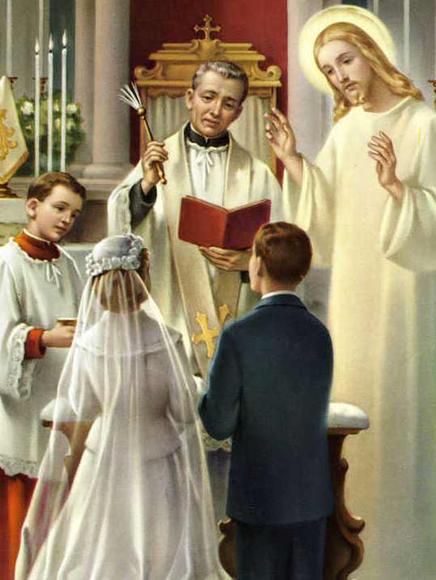
Gospel, Mark 10:2-16 2 Some Pharisees approached him and asked, 'Is it lawful for a man to divorce his wife?' They were putting him to the test. 3 He answered them, 'What did Moses command you?' 4 They replied, 'Moses allowed us to draw up a writ of dismissal in cases of divorce.' 5 Then Jesus said to them, 'It was because you were so hard hearted that he wrote this commandment for you. 6 But from the beginning of creation he made them male and female. 7 This is why a man leaves his father and mother, 8 and the two become one flesh. They are no longer two, therefore, but one flesh. 9 So then, what God has united, human beings must not divide.' 10 Back in the house the disciples questioned him again about this, 11 and he said to them, 'Whoever divorces his wife and marries another is guilty of adultery against her. 12 And if a woman divorces her husband and marries another she is guilty of adultery too.' 13 People were bringing little children to him, for him to touch them. The disciples scolded them, 14 but when Jesus saw this he was indignant and said to them, 'Let the little children come to me; do not stop them; for it is to such as these that the kingdom of God belongs. 15 In truth I tell you, anyone who does not welcome the kingdom of God like a little child will never enter it.' 16 Then he embraced them, laid his hands on them and gave them his blessing. REFLECTION:
Authentic commitment today is a hard-to-find treasure. It is lost anywhere within the bustling human civilization. We rarely find it being valued in its truest sense within a relationship. Rather today, a massive masquerade sugar-coats simulated commitments and substitutes the real ones. “Commitments” nowadays are contractual, short-lived, conditioned and temporary. If we find real ones, we have to search it in the utmost regions of society where lives are not yet contaminated by the post-modern mind-set of materialism and individualism.
The readings today provide us Christians of this post-modern age with an opportunity to relook and rediscover the meaning of radical commitment in every human relationship, marriage being the relationship par excellence. Beginning to meditate authentic commitment in the context of marriage, our Lord Jesus shows us that being committed is not a simple relating of feelings to the other. Commitment is not a selective attitude over possible choices. Commitment is a gift of the whole person to the other; it is the act of uniting oneself not only in the level of feelings or of intellect. It is the capacity to assume the other to oneself, embracing the other even his defects along with the things which initially attracts us.
The book of Genesis retells the story of man’s first days on earth when he tried to search out for a suitable partner among God’s creatures. He names them and from that act man acknowledges the individual sentient beings’ capacity of relating. But he found none of them that can par man’s level or capacity of companionship. Man cannot make a commitment by personally involving himself to an animal who has only the perfection of instinct. It cannot par man’s capacity to love. That is why, God has taken from his “own flesh and own bone” the one who could give him the same companionship and commitment to love. From this man’s existential need, God created “woman”; she is the person who equals man’s capacity to love and to make this primitive commitment on the face of the earth meaningful and indeed God-like.
Realizing how God founded and endowed this relationship with his own initiative, man must therefore look back to this first moment as the principle of every relationship. Commitment, in order to be truly authentic must be founded in love which God has bestowed in the bond of conjugal commitment. Thus, we must respect marriage as an institution which only God can break and no man can split apart; it is also an epitome of every other level of relationship which we are taking up in this life. In the Letter to the Hebrews, the author puts so lovely the act of Jesus’ self-emptying as a way to express real or authentic commitment to his mission. Dying on the cross and taking up the burden of ransoming for us sinners, Jesus was able to reunite the lost children of God. Thus his death is the relinking of the lost commitment of man to God; it is the key to the passage of men who returns to God as their Father. His faithfulness to his mission as savior fills the gap of man’s un-commitment. That is why, in doing so, Jesus calls us his brothers, we who consecrate and being consecrated to the bond of unity which was restored by his death and resurrection.
Now, as he himself offers us a point of reference of this commitment by reuniting what was lost for God, Jesus takes up the ever controversial issue of marriage to profoundly communicate to man the challenge of serious commitment. Now smeared and twisted by the hardness of human heart, marriage lost its real meaning as the symbol authentic commitment and a reminder of God’s loving commitment to his people. Jesus is consistently firm. He upholds the permanence of marriage which only God had founded long before the foundations of the created world. He calls those who modify the meaning of marriage as “hard hearted”, people who refuse to adjust to the Divine Command and expect that the Divine should adjust to their whim. This people who try to attack the foundations of marriage is like attacking God himself and attacking the bond of God’s commitment to us – God’s love for his people. Indeed, Jesus calls those who refuse to heed on the permanence of marriage as hard-hearted because a hard heart is a heart that refuses to love, to accept, to assume and to be one with the other. By attacking marriage and therefore God, these hard-hearted people shut their capacity to openness and decline to assume God in their lives. They are also firm to close a permanent bond between his fellow other thus making commitment a mere “temporary” event which can last until such time when one is tired of maintaining such pseudo-commitments.
Today, the same defiance of those hard-hearted people continued to haunt the institution of marriage and of the rest of divinely-inspired commitment in relationships. A lot of people still challenge the permanence of this commitment. They also try to alter the meaning of marriage. By this, the whole system of life, the moral fabric of society is threatened because if marriage would be deprived from its original meaning set by God before, then, the whole meaning of relationship will crumble with it. All relationships found and draw all its inspiration from the model of marriage which God has set before men as an example of undying commitment of love. If we allow hard-hearted men to destroy marriage and substitute real commitments into false ones, our whole person will live in falsity, too; we will love what is false and, like it, temporary and short-lived, we will not last long. We will crumble with it. Unlike God-founded commitment which is enduring, ours will fade like a passing shadow.
Fray Ric Anthony Reyes, OSA
 Gospel, Mark 9:38-43, 45, 47-4838 John said to him, 'Master, we saw someone who is not one of us driving out devils in your name, and because he was not one of us we tried to stop him.' 39 But Jesus said, 'You must not stop him; no one who works a miracle in my name could soon afterwards speak evil of me. 40 Anyone who is not against us is for us. 41 'If anyone gives you a cup of water to drink because you belong to Christ, then in truth I tell you, he will most certainly not lose his reward. 42 'But anyone who is the downfall of one of these little ones who have faith, would be better thrown into the sea with a great millstone hung round his neck. 43 And if your hand should be your downfall, cut it off; it is better for you to enter into life crippled, than to have two hands and go to hell, into the fire that can never be put out. 45 And if your foot should be your downfall, cut it off; it is better for you enter into life lame, than to have two feet and be thrown into hell. 47 And if your eye should be your downfall, tear it out; it is better for you to enter into the kingdom of God with one eye, than to have two eyes and be thrown into hell 48 where their worm will never die nor their fire be put out. REFLECTION:This Sunday, Jesus teaches us about tolerance. Tolerance (or 'pagpaparaya' in Filipino) is often associated with being permissive. Being tolerant or permissive is suspect; it has to be checked if it could lead to abuse of freedom or to violent consequences. A mother, who is not able to correct her children’s bad behaviour early in life, is being tolerant in a wrong way. Tolerance could also be right in other cases. In fact, it would be a big mistake to view tolerance in its negative value only.
In the gospel, Jesus asks his disciples to be tolerant. If tolerance were not good, why would Jesus require such from his disciples? As narrated, it started when after the disciples ‘saw someone driving out demons’ in the name of Jesus, they prevented him from performing exorcism because he did not belong to the followers of Jesus.
We could only surmise what were in the minds of the disciples. Were they jealous because the man could also cast demons though he was not one of them? Were they angry because they have assumed that the power to exorcise demons was a privilege given only to the followers of Jesus and not to any other person? The disciples were confused. Suddenly, what they have thought to be their exclusive right was no longer their own alone.
Jesus had his reasons: ‘Do not prevent him,’ he said, ‘there is no one who performs a mighty deed in my name who can at the same time speak ill of me. For whoever is not against us is for us.’ With these words, Jesus has taught his disciples about tolerance more as an exercise of Christian humility and charity.
This teaching is so relevant for us today. We should not think that salvation is reserved only for us who were baptized and who believe in Christ. Membership to his Church, faith, and the sacraments are still considered the ordinary ways to receive salvation, but this does not exclude the possibility that God could offer other ways of bringing people to encounter the ‘paschal mystery of Christ’ in their lives. Like the outsider who performed exorcism in the name of Jesus, we have to understand that it is really Jesus who is the true source of salvation; the rest is just his medium.
Jesus calls us to religious tolerance, as long as it is not against him and his teachings. It is prudence perhaps that sometimes makes us doubt whether something or someone should be tolerated or not. However, Jesus challenges us towards religious tolerance so that individually we also learn to discern about the faith we have received: what is truly to follow Christ, how is it really to belong to him, what does it really mean to be a Catholic? In the answers our salvation is found.Contributor:FMAGS, OSA
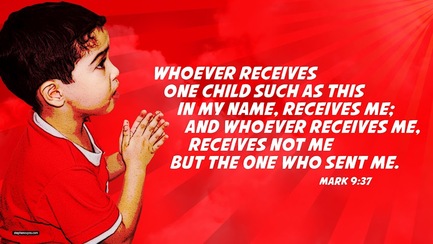 Reading 1, Wisdom 2:17-2017 Let us see if what he says is true, and test him to see what sort of end he will have. 18 For if the upright man is God's son, God will help him and rescue him from the clutches of his enemies. 19 Let us test him with cruelty and with torture, and thus explore this gentleness of his and put his patience to the test. 20 Let us condemn him to a shameful death since God will rescue him -- or so he claims.' Responsorial Psalm, Psalms 54:3-4, 5, 6-83 Arrogant men are attacking me, bullies hounding me to death, no room in their thoughts for God.Pause 4 But now God is coming to my help, the Lord, among those who sustain me. 5 May their wickedness recoil on those who lie in wait for me. Yahweh, in your constancy destroy them. 6 How gladly will I offer you sacrifice, and praise your name, for it is good, 7 for it has rescued me from all my troubles, and my eye has feasted on my enemies. Reading 2, James 3:16--4:316 Wherever there are jealousy and ambition, there are also disharmony and wickedness of every kind; 17 whereas the wisdom that comes down from above is essentially something pure; it is also peaceable, kindly and considerate; it is full of mercy and shows itself by doing good; nor is there any trace of partiality or hypocrisy in it. 18 The peace sown by peacemakers brings a harvest of justice. 1 Where do these wars and battles between yourselves first start? Is it not precisely in the desires fighting inside your own selves? 2 You want something and you lack it; so you kill. You have an ambition that you cannot satisfy; so you fight to get your way by force. It is because you do not pray that you do not receive; 3 when you do pray and do not receive, it is because you prayed wrongly, wanting to indulge your passions. Gospel, Mark 9:30-3730
After leaving that place they made their way through Galilee; and he did not want anyone to know,
31 because he was instructing his disciples; he was telling them, 'The Son of man will be delivered into the power of men; they will put him to death; and three days after he has been put to death he will rise again.'
32 But they did not understand what he said and were afraid to ask him.
33 They came to Capernaum, and when he got into the house he asked them, 'What were you arguing about on the road?'
34 They said nothing, because on the road they had been arguing which of them was the greatest.
35 So he sat down, called the Twelve to him and said, 'If anyone wants to be first, he must make himself last of all and servant of all.'
36 He then took a little child whom he set among them and embraced, and he said to them,
37 'Anyone who welcomes a little child such as this in my name, welcomes me; and anyone who welcomes me, welcomes not me but the one who sent me.'REFLECTION:
“If you should ask me what are the ways of God, I would tell you that the first is humility, the second is humility, and the third is humility. Not that there are no other precepts to give, but if humility does not precede all that we do, our efforts our meaningless.” So said by our great father Saint Augustine. True enough, humility is the only way towards God for it is through this way that God can be seen in the simplicity of faith’s vision.
The readings this Sunday are sign posts towards this realization. They point out to us the path of humility as a sure way to God: the image of the child in the gospel speaks of humility, of littleness and of simplicity. But, we ask, why did God chose the way of humility in order to show us the path toward him? With this question, let us try to discern God’s Word in the readings.
The suffering of a just man in the first reading reflects first the way of the suffering for the sake of God. Like the first reading last Sunday, today, the Book of Wisdom pictures the humbling experience of man who pursues for God: trapped, slandered and even tested his patience to drop his faith. But he did not give up; he persevered on this humbling experience just for the sake of keeping his eye to God. The reading is a reminder that to pursue God, we must pass through the alleys of humility.
James on the one hand shows us how jealousy and ambition ruins peace and harmony. The only attitude that would yield humanity with peace is the way of the above: the pursuit of wisdom. But James added. Wisdom is not an overpass for all difficulties. It is rather a way of the lowly. Wise persons know how to understand, they are full of compassion and good works and – the most important – they know how to listen. In the second reading, James therefore establishes that the way of wisdom is the way of down-to-earth and humble people for they know how to integrate themselves to the lowly. It is not like those who desire greatness through wrong motives – they end up into squabbles and fighting.
The Gospel from Mark culminates the message of humility. When the Lord himself predicts his passion to his disciples, he shows that his glorification with the Father is preceded by the way of humility: the way of the cross. But his disciples are in complete opposite to him. They thought that Jesus wins a flawless victory. His disciples are the reverse of what James had told us. The disciples did not understand simply because Jesus’ wisdom has not met their own standard. They thought Jesus as immensely powerful combatant. But Jesus shows them the humility of the messiah. The messiah who will win the salvation is like a child: humble, docile, open and persistent. In the image of the child Jesus tells his disciples to transpose their tenor of expectation into a lower key; this key is the key of humility. True greatness in God is reached on the level of real lowering of oneself. In this level, a person who pursues God’s level can shed his personal pride: his wrong motives, ill desires, and bad conducts. The act of humility passing through suffering, as Saint Paul said suffering produces endurance, this endurance produces character, and on the one hand this character produces hope that will not disappoint us because God’s love is poured in us (see Rom. 5:3). Humility therefore is a purified intention of the soul that reaches to the realm of God who himself touches our person in the very act of humility of his self-emptying.
Augustine is right to say that humility are steps to God. It is so because humility is the act of emptying ourselves of our own uncoordinated wishes. Cleansing ourselves from the purifying sufferings which is passed through the way of humility, man is able now to participate to the greatness of God. Jesus has shown us his example. May we understand now the message of his passion and death while we are walking through the road of Christian living. Humility is the message of his sufferings and that is why we must embrace humility so that our own effort of imitating our Lord will not be an inert meaninglessness.
Contributor:Fray Ric Anthony Reyes, OSA
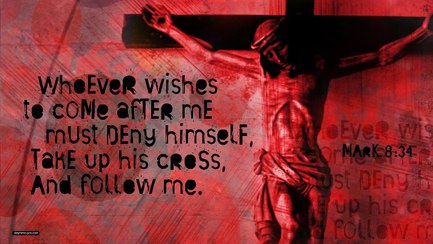 Honestly, I find the feast of the Exultation of the Cross liturgically misplaced. At first, when we recall of a cross, what comes into our mind is Good Friday, or at least the Holy Week and the Lenten Season. It is in these liturgical days when the theme and the figure of the cross find its suitable place. But why September 14 is the feast of the Triumph of the Cross? What in the world does this mean? Does it really a misplaced feast or it is just appropriate to celebrate a tightly-tied mystery of our faith to the Paschal Triduum in some unanticipated ordinary season of the Liturgical life of the Church?
The liturgical notes of September 14 in the Ordo of Liturgical Celebrations tell us that the celebration must be an appropriate time because of a “double event” in the Church history. In brevity, it is historically imbued. First, on that day, Constantine, the Roman emperor who allowed Christians to practice publicly their faith (remember the “Licet esse Christianos” thing), erected the Church ofAnastasis. This is the Church that houses the empty grave of Jesus Christ. Anastasis simply means “resurrection” or an act of “drawing from one stance or state” if my memory in Greek serves me best. So this is the Church of the Resurrection. At the same time, it he constructed the Basilica called theMartyrium and the spot of Calvarium. This complex of buildings joined as one big Church in Jerusalem house the spots of the greatest events of the history of salvation. The Church was dedicated in 335. Another important event happened which is commemorated on this day. It was the miraculous discovery of the Lord’s Cross by the mother of the Emperor above, the Empress Saint Helena in 320. She found the cross after identifying it when a sick person got healed when he touched the true relic.
But these historical events must have an impact to us as we continue to live the ordinariness of Christian life in this ordinary season. In reality, even the feast exists on this day or not, let us not forget that the mystery of the cross is not an out-dated or a mere seasonal theme or icon in Christian life. The cross must always be a part of our life for it was willed by Jesus to be part of his life here on earth; it is his passage way towards new life. The cross is essentially united to the mystery of the resurrection of Christ; whenever we speak of resurrection, we must speak and cannot but speak of the cross. For without it, the resurrection of Christ is impossibl; the lifting from our own old state to another had not happened. Through the cross, the drama of salvation had begun and the fruits of Jesus’ death and resurrection reach us all time, anywhere and to everyone. Thus, Christian life is imbued by the shadow of the cross as much as it is enlightened by the glory of resurrection. It is inseparable to it; Christ’s cross and resurrection is one. God’s will of salvation is universal and it is appropriate that the cross is always a fresh reminder of salvation and a signification of our unity under the one faith gifted by the grace of Jesus’ resurrection.
So, as we celebrate today the glory of the cross through the memory of the distant histories, let us not forget to approach the shade of this living tree with renewed commitment to incorporate the mystery of redemption in our lives. Let us renew under it our commitment to live always will of God. Christian life is best lived if it is docile to the promptings of the Holy Spirit and by carrying our own crosses along the path of Christ. May we consider always finding our origin under the cross of Christ.
Lastly let us take heed of what Saint Paul had written: “…but we proclaim Christ crucified, a stumbling block to Jews and foolishness to Gentiles, but to those who are called, Jews and Greeks alike, Christ the power of God and the wisdom of God” (1Co 1:23-24 NAB). Christ crucified is wisdom of God. This is the wisdom of love, the wisdom of unconditional love for his beloved people. It is also a power of God, the power of God to draw us into him to lift up with him on the cross. God has initiated the way of the cross; come let us follow it with authentic love and devotion.
 Reading 1, Joshua 24:1-2, 15-17, 181 Joshua gathered all the tribes of Israel together at Shechem; he then summoned all the elders of Israel, its leaders, judges and officials, and they presented themselves in God's presence. 2 Joshua then said to all the people: 'Yahweh, the God of Israel, says this, "From time immemorial, your ancestors, Terah, father of Abraham and Nahor, lived beyond the River, and served other gods. 15 But if serving Yahweh seems a bad thing to you, today you must make up your minds whom you do mean to serve, whether the gods whom your ancestors served beyond the River, or the gods of the Amorites in whose country you are now living. As regards my family and me, we shall serve Yahweh.' 16 The people replied, 'Far be it from us to desert Yahweh and to serve other gods! 17 Yahweh our God was the one who brought us and our ancestors here from Egypt, from the place of slave-labour, who worked those great wonders before our eyes and who kept us safe all along the way we travelled and among all the peoples through whom we passed. 18 And Yahweh has driven all the nations out for us, including the Amorites who used to live in the country. We too shall serve Yahweh, for he is our God.' Reading 2, Ephesians 5:21-3221 Be subject to one another out of reverence for Christ. 22 Wives should be subject to their husbands as to the Lord, 23 since, as Christ is head of the Church and saves the whole body, so is a husband the head of his wife; 24 and as the Church is subject to Christ, so should wives be to their husbands, in everything. 25 Husbands should love their wives, just as Christ loved the Church and sacrificed himself for her 26 to make her holy by washing her in cleansing water with a form of words, 27 so that when he took the Church to himself she would be glorious, with no speck or wrinkle or anything like that, but holy and faultless. 28 In the same way, husbands must love their wives as they love their own bodies; for a man to love his wife is for him to love himself. 29 A man never hates his own body, but he feeds it and looks after it; and that is the way Christ treats the Church, 30 because we are parts of his Body. 31 This is why a man leaves his father and mother and becomes attached to his wife, and the two become one flesh. 32 This mystery has great significance, but I am applying it to Christ and the Church. Gospel, John 6:60-6960 After hearing it, many of his followers said, 'This is intolerable language. How could anyone accept it?' 61 Jesus was aware that his followers were complaining about it and said, 'Does this disturb you? 62 What if you should see the Son of man ascend to where he was before? 63 'It is the spirit that gives life, the flesh has nothing to offer. The words I have spoken to you are spiritand they are life. 64 'But there are some of you who do not believe.' For Jesus knew from the outset who did not believe and who was to betray him. 65 He went on, 'This is why I told you that no one could come to me except by the gift of the Father.' 66 After this, many of his disciples went away and accompanied him no more. 67 Then Jesus said to the Twelve, 'What about you, do you want to go away too?' 68 Simon Peter answered, 'Lord, to whom shall we go? You have the message of eternal life, 69 and we believe; we have come to know that you are the Holy One of God.' REFLECTION:The gospel of today, conscious that it is now the concluding part of the Bread of Life discourse, caps with the two prominent attitudes towards Jesus’ Words: disappointing unbelief and the steadfastness of faith. These two reactions set us into our meditation today as it allows us to situate our faith in the context of Jesus’ challenge of abandoning ourselves to him. Mindful of the context provided by the previous three Sundays, the Bread of Life discourse unfolds a challenging message. But the focal point of the Bread of Life discourse is Jesus’ invitation to entrust our faith to him; for whoever believes in Him receives eternal life. And since Jesus picked up the image of eating from the sign he had done before this discourse, Jesus challenges those who have eaten that bodily bread, to entrust their faith into a new and greater level. They must not only believe in him just because he has able to provide bread from out of scarce. Rather, they must believe in him because He is the Bread of Life himself. Yet, the long and arduous discussion over this matter yielded a greater unbelief from among his circle. Jesus’ disciples cannot accept a hard saying which Jesus dares them to stand for. They cannot understand Jesus’ revelation and indeed the promise of that revelation which is eternal life is not clear to them. Consequently, they have to desert the Lord because he sounds untenable, weird and eccentric. Who is going to eat the flesh and drink the blood of someone and from which action (which is first and foremost unacceptable) one gains eternal life? The disciples found it puzzling and it does not practically make sense! For them, perhaps, that is the most unbelievable; it is out of one’s right mind to realize that.
But hope sprouts from that sad story of abandonment. The apostles themselves, now facing the challenge, take a stand to believe. Peter, their spokesperson, answers Jesus’ challenge not heroically but it is an answer of full entrustment; it is an answer total self-abandonment. Unlike the previous disciples who saved their skin from the mystery and abandon Jesus on account of this; Peter and his comrades abandon themselves to the mystery of Jesus. He said: “Lord, to whom shall we go? You have the words of eternal life; and we have believed, and have come to know, that you are the Holy One of God” (Joh 6:68-69 RSV). The apostles’ confidence is well-founded on their hope that Jesus will make sense; if not that discernible for now; perhaps at some future time. But, they believe that by the fact that they throw themselves to the mystery of God, to his words of eternal life, they begin a journey of faith that will surely open to them paths that will make this faith meaningful in their lives. Faith in God does not start with some clear picture of the future promise; it starts something as a dimly vision in a mirror (cf. 1 Cor. 13:12) as Paul tries to express it, but surely later it will reveal itself when “face to face” one can behold the object of this faith. Peter and the apostles risk for a faith through faith and they did this not because they have the capacity to do it. It is God’s grace that moves them. Like also Mary, the Mother of Jesus, who at first cannot picture the message of the angel to her to become the Mother of the Savior, throws herself to the action of God’s grace so that she will accept God’s will to her even without a complete or sufficient knowledge of what she is entering into.
God’s grace of faith is what makes life more meaningful and grounded; a life even stormed by the physical strength of problems, can always trust and anchor its hope in God. This is what is lacking with those who abandoned Jesus, they had not been docile to the action of God’s grace but rather, as we have meditated Sundays before, they listen contently to the murmur of their own making and thus listening to their own voices which can never do great apart from God’s grace. Like Joshua in our first reading, let us continually be confident in proclaiming our steadfastness to God even though heaps of challenges and problems bump us along the journey of faith. Without faith, we cannot profess our service to Jesus, because without faith, he is meaningless in us. Our confidence in him too finds meaning, our life story – the whole of it with all the good and bad chapters, our sufferings, our joys are only meaningful because it is tied in faith in Christ Jesus.
Concluding this meditation, I take the word from our Holy Father, Benedict XVI who said: “We see that to be God’s child is not a matter of dependency, but rather of standing in the relation of love that sustains man’s existence and gives it meaning and grandeur” (Pope Benedict XVI, Jesus of Nazareth Part I, p. 139). Indeed, faith allows us to recognize our relationship with God not because we are dependent, not because we see him providing bread for our physical hunger. We recognize this relationship as love; a relationship truly imbued by God’s own initiative of calling us through faith. From that initiative of God calling us, we configure ourselves to him, shaping our life’s meaning according to his will.Contributor:Fray Ric Anthony Reyes, OSA
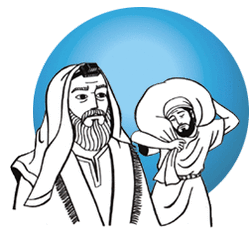 Ez 43: 1-7abPs 85 Mt 23: 1-12 They do not practice 1 Then addressing the crowds and his disciples Jesus said, 2 'The scribes and the Pharisees occupy the chair of Moses. 3 You must therefore do and observe what they tell you; but do not be guided by what they do, since they do not practise what they preach. 4 They tie up heavy burdens and lay them on people's shoulders, but will they lift a finger to move them? Not they! 5 Everything they do is done to attract attention, like wearing broader headbands and longer tassels, 6 like wanting to take the place of honour at banquets and the front seats in the synagogues, 7 being greeted respectfully in the market squares and having people call them Rabbi. 8 'You, however, must not allow yourselves to be called Rabbi, since you have only one Master, and you are all brothers. 9 You must call no one on earth your father, since you have only one Father, and he is in heaven. 10 Nor must you allow yourselves to be called teachers, for you have only one Teacher, the Christ. 11 The greatest among you must be your servant. 12 Anyone who raises himself up will be humbled, and anyone who humbles himself will be raised up. REFLECTION:In today's Gospel we hear Jesus denouncing the scribes and the Pharisees. Jesus instructed his disciples and the crowd to follow what they preach but not what they do.
We should admit that not all the scribes and Pharisees during those times are signs of contradictions unto themselves. However, the Gospel writer used them to teach us a very important lesson that our Blessed Lord wants us to learn. We should not be people of dichotomization.
What we say should reflect our actions. If we say this is bad and should not be done, then we, ourselves, are bound not to do it. The preacher himself should be the first one to practice what he is preaching. This is the right thing to do.
But we are humans, weak and easily tempted. Due to this reality we falter and sometimes contradict what we preach to others. God surely understands us because Christ himself experienced how it is to be tempted. We are weak, yes, but we are also capable of transcending to be able to resist temptation. All we need to do is trust in God and pray to pass each test.
Let us not be like the Pharisees and scribes described in the Gospel today. Let us try harder to resist temptations and pray harder. Let us not be like the Pharisees who have been dichotomized because of their contradicting words and actions. Contributor:Fray Aimark Asor, OSA
 Ez 36: 1-11Ps 23 Mt 20: 1-16 20 “For the kingdom of heaven is like a landowner who went out early in the morning to hire workers for his vineyard. 2 He agreed to pay them a denarius[ a] for the day and sent them into his vineyard. 3 “About nine in the morning he went out and saw others standing in the marketplace doing nothing.4 He told them, ‘You also go and work in my vineyard, and I will pay you whatever is right.’ 5 So they went. “He went out again about noon and about three in the afternoon and did the same thing. 6 About five in the afternoon he went out and found still others standing around. He asked them, ‘Why have you been standing here all day long doing nothing?’ 7 “‘Because no one has hired us,’ they answered. “He said to them, ‘You also go and work in my vineyard.’ 8 “When evening came, the owner of the vineyard said to his foreman, ‘Call the workers and pay them their wages, beginning with the last ones hired and going on to the first.’ 9 “The workers who were hired about five in the afternoon came and each received a denarius. 10 So when those came who were hired first, they expected to receive more. But each one of them also received a denarius. 11 When they received it, they began to grumble against the landowner.12 ‘These who were hired last worked only one hour,’ they said, ‘and you have made them equal to us who have borne the burden of the work and the heat of the day.’ 13 “But he answered one of them, ‘I am not being unfair to you, friend. Didn’t you agree to work for a denarius? 14 Take your pay and go. I want to give the one who was hired last the same as I gave you. 15 Don’t I have the right to do what I want with my own money? Or are you envious because I am generous?’ 16 “So the last will be first, and the first will be last.” Reflection:
Today's Gospel shows the generosity of God to his people. The story about the workers in the vineyard indirectly say this. God gives us according to what we need. The master who hired laborers in the story is not unjust but rather, he gives out or compensate according to his desire. In the same way, God gratuitous grace is give to all according to what our need. And God could never be labeled unjust. Justice belongs to him, how can he be called unjust?
The whole Roman Catholic Church is also commemorating the Queenship of our Blessed Mother, Mary. God was so generous so as to share his only begotten Son for the remission of our sins. And for this to happen, he needed to enter into human historicity in a natural manner. This necessitated the Father to choose a woman to give her humanity to the Divine. This is the greatest mystery of humanity; a God assuming human flesh to die for humankind. Thus, Mary played a very important role in the story of Christ's incarnation.
With Mary's "fiat" God was able to walk in our midst physically. And with the sending of the Archangel Gabriel to the young girl kneeling in prayer, God's generosity overflowed from all eternity. That is why it is but then proper for us to give the Mother of God, Θεοτοκος, the highest honor, hyperdulia, but not worship.
God's generosity knows no bound. All we need to do is to go to him and be sorry for the wrong things we have done. And let us ask the intercession of our Blessed Mother to help us in approaching her Son.
In God's loving mercy, we trust...
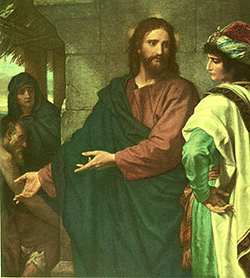
Ez 28:1-10
Dt 32
Mt 19:23-30 Eye of a needle
Gospel Reading:
23 Then Jesus said to his disciples, “Truly I tell you, it is hard for someone who is rich to enter the kingdom of heaven .24 Again I tell you, it is easier for a camel to go through the eye of a needle than for someone who is rich to enter the kingdom of God.” 25 When the disciples heard this, they were greatly astonished and asked, “Who then can be saved?” 26 Jesus looked at them and said, “With man this is impossible, but with God all things are possible.” 27 Peter answered him, “We have left everything to follow you !What then will there be for us?” 28 Jesus said to them, “Truly I tell you, at the renewal of all things, when the Son of Man sits on his glorious throne, you who have followed me will also sit on twelve thrones, judging the twelve tribes of Israel. 29 And everyone who has left houses or brothers or sisters or father or mother or wife [a] or children or fields for my sake will receive a hundred times as much and will inherit eternal life. 30 But many who are first will be last, and many who are last will be first. Reflection:"For human beings this is impossible, but for God all things are possible."
The Gospel reading today is the continuation of yesterday's story about the rich young man who asked Christ what must he do to gain eternal life.
Today the reading speaks about an analogy popular to us. It is about a camel passing through the eye of a needle. Scholars explains this by getting into the jargon and context of the story. Nevertheless, for a commoner one thing is certain. It is unimaginable for a camel to enter a needle's eye. Because of this, most people think that entering the Kingdom of God is totally difficult.
Though this might be the case, Jesus declared that for humans this could be impossible but never for God. Once again Jesus asserted that we need God. In everything we do God's role is indispensable. Without him, whatever we do will be in vain. Therefore, we need to depend on God. With his loving mercy and compassionate heart it is possible for humans to enter his glorious Kingdom but it takes great humility to be able to.
The latter part of the Gospel talks about the apocalyptic return of the Son of God wherein he would be judging the twelve tribes of Israel. Yesterday's Gospel was linked here because it was said that during the judgement day those who have given up everything for God's sake will receive a hundred times more, even eternal life would be given them.
This is the lot of those who, by their own will, have decided to follow Christ and be prophetic signs into the world. If they have suffered and sacrificed a lot on earth for the sake of the Christ, eternity would certainly be theirs.
In life, to follow Christ radically is not at all easy. We give so many reasons just to excuse ourselves from doing what is right. We want things to be always easy and comfortable for us. What we tend to forget is the fact that God's way is not the easy way. His way is through the Cross. Let us think about this and try harder to live a life worthy of Christ.
In God's loving mercy, we trust...
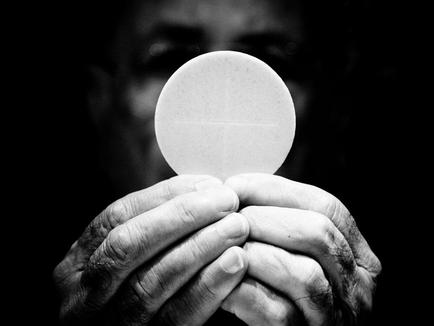 Reading 1, Proverbs 9:1-6 Responsorial Psalm, Psalms 34:2-3, 10-11, 12-13, 14-15 Reading 2, Ephesians 5:15-20 Gospel, John 6:51-58 51 I am the living bread which has come down from heaven. Anyone who eats this bread will live for ever; and the bread that I shall give is my flesh, for the life of the world.' 52 Then the Jews started arguing among themselves, 'How can this man give us his flesh to eat?' 53 Jesus replied to them: In all truth I tell you, if you do not eat the flesh of the Son of man and drink his blood, you have no life in you. 54 Anyone who does eat my flesh and drink my blood has eternal life, and I shall raise that person up on the last day. 55 For my flesh is real food and my blood is real drink. 56 Whoever eats my flesh and drinks my blood lives in me and I live in that person. 57 As the living Father sent me and I draw life from the Father, so whoever eats me will also draw lifefrom me. 58 This is the bread which has come down from heaven; it is not like the bread our ancestors ate: they are dead, but anyone who eats this bread will live for ever. REFLECTION:
Reflection for August 19, 2012 - Jn. 6:51-58 20th Sunday in Ordinary Time: Communion to Eternal Life: God’s Promise and the Goal of the Church
Since the inauguration of Vatican II Council, the Church focuses herself to the ecclesiological vision of communion. She understands herself as a Communion. As a communion, the Church wants to renew her life by going back to the very foundation of her existence – and thus, she goes back again and again to Jesus Christ, her husband. In this way, the Church as our Mother teaches us to do the same. She teaches us to the way of communion according to the primordial zeal and enthusiasm of the first Jerusalem community (Acts 4:32-37). By constantly renewing herself to communion with her husband, the Church becomes constantly committed to her vocation of calling every believer back to Christ. This vocation, this called to live out a life of communion is rooted on the inspiration of the Eucharist; Jesus’ gift of his body and blood, his sacramental presence.
Our initial meditation of the mystery of communion of the Church to Christ becomes an inseparable fruit of the message of today’s Gospel reading. While still on the same Discourse on the Bread of Life, we encounter the insistent and bold promise of Jesus in the gospel. Jesus as the Bread of Life that comes from the Father and gives eternal life is the initial unfolding of the discourse. But in this part of the gospel, we encounter Jesus’ promise to those who receive him in faith: “He who eats my flesh and drinks my blood abides in me, and I in him” (Joh 6:56 RSV). Jesus now reveals himself to be present on those who receive him. There is communion between Jesus and the believer. Contained this promise, viewed against the full background of the discourse, is Jesus’ assurance of eternal life to those who eat his flesh and drink his blood. Thus, being in communion with Jesus is actually in communion with life eternal in Jesus. To receive him means to participate in the communion of eternal life of God and even I dare say, it is our participation to the Trinitarian life.
The Church’s vocation to live out a life of communion, inspired by the Eucharist is rooted ultimately on the promise of the ultimate communion in the life of God. The Church herself is not the end or the goal of communion; it is the means to that ultimate communion promised in today’s gospel. The communion of the Church is a means of remedying the wound that has been caused by sin. We know that God’s plan “was to raise men to a participation of the divine life” (Lumen Gentium, 2); but we equally know that sin broke the integrity of creation, and particularly, that of man. That is why, God had offered his Son be broken also in the sacrifice of the cross, indeed, like a bread being broken to be shared by humanity in order that those who consume in faith the saving “brokenness” of the Son of the Cross will be drawn in unity to Him. Indeed, they will look on him whom they pierced (cf. Zec. 12:10; Jn 19:37); and from which pierced side, blood and water, symbols of the Eucharist and Baptism, flow as a saving bath and drink for those who heed and gathered in faith under His cross. There, the Church is born.
This gaze to the saving death, to the brokenness of the Son on the cross serves the inspiration of the Church continually draw men and women to Christ. She herself will be a sacrament to all for Christ, calling to everybody in repentance and join the community of believers. So, the Church has not been static under the cross. Christ’s resurrection and ascension mandated her to go and proclaim his teachings which ratified by his resurrection from the dead. By doing so, the Church, from the time of resurrection until the parousia, walks and lives out her vocation to communion, calling and drawing men and women of all walks of life. She is a pilgrim Church – a Church that journeys into the fulfillment of Christ’s promise while trying to embodying it along the way.
In the journey, she encounters all kinds of difficulties and temptations of evil ways. But, inspired by Jesus, she struggles to oppose the current. Thus, she is also tired, tensed, stressed and exhausted. At times, her very exhaustion tempts her to quit. But, the very same Jesus, the sacrament of the Eucharist, the gift of the pierced one keeps her strengthened spiritually. This is why, as Christians, we are always invited to eat the flesh of the Lord in the bread of the Eucharist. There, we are being strengthened, refreshed and fortified against the malicious ways of the present age. The Eucharist is our viaticum in this earthly journey; a food that assures our continual communion with Christ despite walking the dark valley. This is the prefiguration of the first reading today. The Eucharist is like the banquet of the personified Wisdom. She always invites us to throw out the life of ignorance and to embrace the life of understanding. (Prov. 9:4-6). In Jesus, the Wisdom of God made flesh, he calls us into the altar of the Eucharist and to share the life of God himself.
Paul’s reminder to the community of Ephesus serves also as a universal reminder also to all of us journeying into our goal. The second reading encourages us to be faithful in the vocation we are called by God into. As a communion of believers journeying to the goal of communion of God’s life, Paul says that it is commendable to avoid the lure of drunkenness in debauchery. He rather calls us to be filled – indeed to be drunk – with God’s Spirit. Through the Eucharist, we are able to eat and drink and assimilate Christ and thus to be Christ-like himself. In doing so, through the Eucharist, the community is “Christified”; transformed into Christ himself. I find it amusing that the second reading has the impression that we should be drunk and intoxicated by Christ so that, along the way, we can avoid the evils of present age. And while walking, we address everyone in singing of psalms and spiritual songs. If one is observant, an intoxicated person sings along the way; Paul tells us too! Let us sing along the way! Augustine has its version. He says, let us sing Alleluia while walking with all our worries. Canta y camina! Sing and walk to eternal life! Sing and walk while enjoying the food for Eternal life! Sing while the promise is nigh! Sing the communion of Christ! Canta y camina!
Contributor: Fray Ric Anthony Reyes, OSA
|










 RSS Feed
RSS Feed